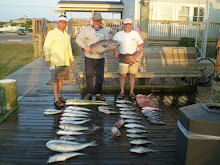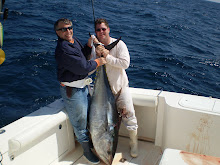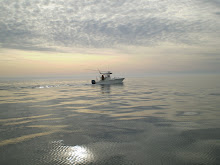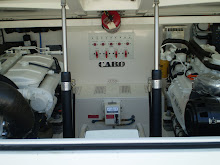
By Jim Field
This brief article (below) in the Wall Street Journal yesterday accompanied promulgation of NOAA's forecasts for the 2010 hurricane season. Given the unscientific nature of weather forecasting, I wonder how much these folks get paid and how much insurance rates for boats, homes, etc. are inflated by "aggressive" prognostications? Unfortunately, the way things work in life (you know where I'm going here), the year we discount worrisome forecasts based on getting it wrong in the past is the year that we get slammed. The weather Gods, of course, conspire to dessimate the fool.
Burned in the Past, Storm Forecasters Aim to Tread Carefully
June 1, 2010
In its forecast for above-average hurricane activity, the National Oceanic and Atmospheric Administration has left itself plenty of wiggle room.
The agency provided a broad range Thursday in its prediction of how many significant storms will occur in the Atlantic this year, expecting anywhere from 14 to 23 "named storms." Even with that amount of latitude, the agency said there is a 30% chance that the number of storms will fall outside the estimated range.
It is possible that NOAA is keeping its estimates loose to avoid having egg on its face later: In the past nine years, NOAA's May storm-count predictions have proved accurate about 40% of the time. NOAA didn't respond to requests for comment. But climate scientists outside the agency note that forecasting hurricane frequency is extremely difficult, especially before the storm season gets under way in June.
Colorado State University research scientist Phil Klotzbach blames the "infamous" challenge of predicting El Niño and La Niña, the climate cycles governing temperature and surface pressure of Pacific Ocean waters. These patterns are critical to hurricane development and hard to analyze before the storm season starts.
The job of forecasting is even tougher earlier in spring, when other climate scientists provide early outlooks for the hurricane season. At University College London, scientists attached a caveat to their hurricane forecast last month—which also called for above-average activity—saying that the precision of such preseason forecasts is "fairly low." In fact, UCL scientists said its hurricane forecasts in the past 10 years have been just 7% closer to the mark than if they had ignored climate signals and merely averaged the prior 10 years of storm data.
Meanwhile, a group led by Dr. Klotzbach at Colorado State acknowledges that the forecast it releases every April is essentially unreliable, though scientists there say they are working to improve the model. The Colorado group has forecast high levels of storm activity that are similar to the NOAA's predictions, and will issue a revised forecast next week.









No comments:
Post a Comment